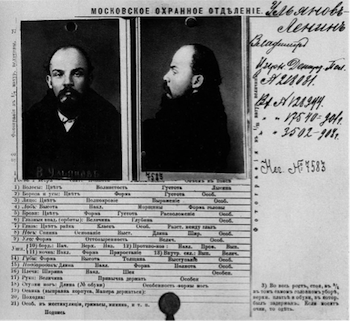

|
What sort of Marxist was Lenin?  Lenin's police record made on his arrest in St. Petersburg in 1896 EXTRACT: Orlando Figes, A People's Tragedy: The Russian Revolution 1891-1924 (Pimlico, 1997), pp. 145-6. There is a legend that on hearing of his brother's death Lenin remarked to his sister Maria: 'No, we shall not take that road, our road must be different.' The implication is that Lenin was already committed to the Marxist cause - the 'we' of the quotation - with its rejection of terror. But this is absurd. Maria at the time was only nine and thus hardly likely to recall the words accurately when she made this claim in 1924. And while it is true that Alexander's execution was a catalyst to Lenin's involvement in the revolutionary movement, his first inclination was, like his brother's, towards the tradition of the People's Will. Lenin's Marxism, which developed slowly after 1889, remained infused with the Jacobin spirit of the terrorists and their belief in the overwhelming importance of the seizure of power. ... Chernyshevsky was his first and greatest love. It was through reading him that Lenin was converted into a revolutionary - long before he read any Marx. Indeed, by the time he came to Marxism, Lenin was already forearmed with the ideas not just of Chernyshevsky but also of Tkachev and the People's Will, and it was these that made for the distinctive features of 'Leninist' approach to Marx. All the main components of Lenin's doctrine - the stress on the need for a disciplined revolutionary vanguard; the belief that action (the 'subjective factor') could alter the objective course of history (and in particular that seizure of the state apparatus could could bring about a social revolution) his defence of Jacobin methods of dictatorship; his contempt for liberals and democrats (and indeed for socialists who compromised with them) - all these stemmed not so much from Marx as from the Russian revolutionary tradition. Lenin used the ideas of Chernyshevsky, Nechaev, Tkachev and the People's Will to inject a distinctly Russian dose of conspiratorial politics into a Marxist dialectic that would otherwise have remained passive - content to wait for the revolution to mature through the development of objective conditions rather than eager to bring it about through political action. It was not Marxism that made Lenin a revolutionary but Lenin who made Marxism revolutionary. |
© 2014 Orlando Figes | All Rights Reserved